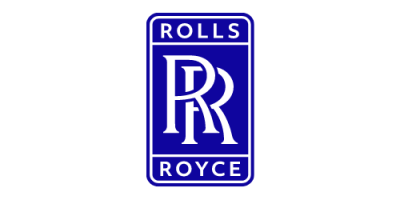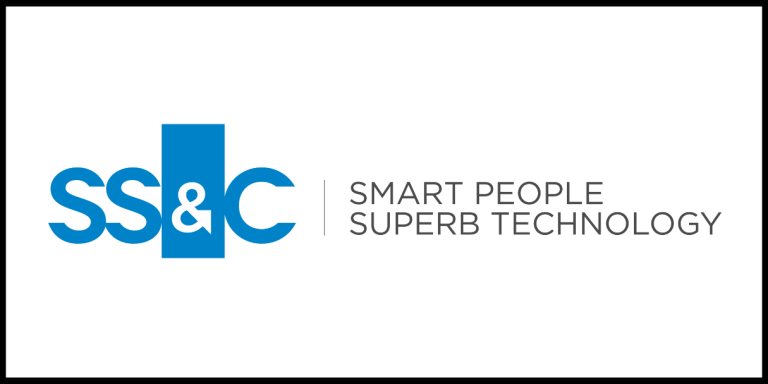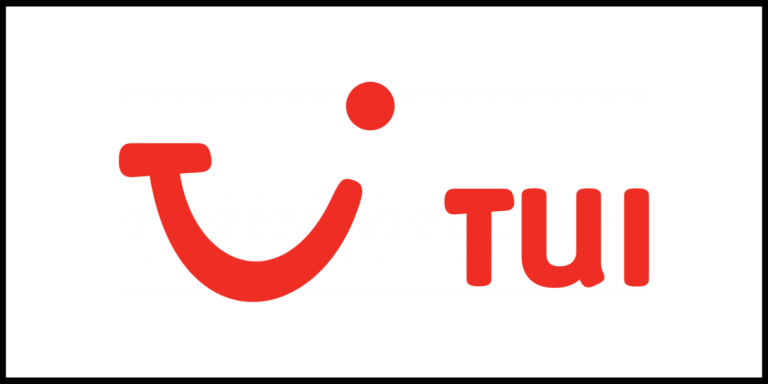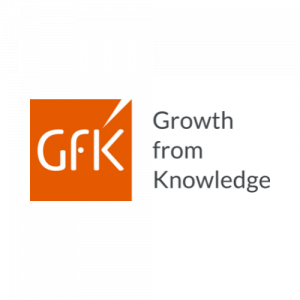From law to data analyst: changing careers through the CFGdegree
Home » From law to data analyst: changing careers through the CFGdegree
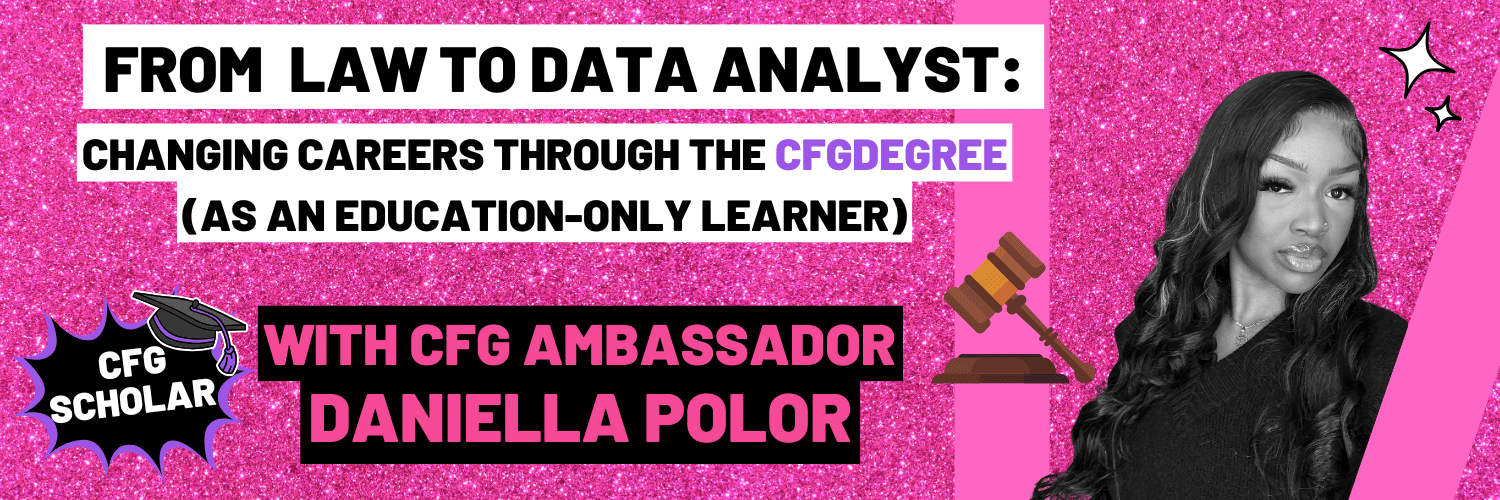
How Daniella went from Law to Tech after completing the CFGdegree
Data Analyst and Code First Girls Ambassador Daniella Polor shares how the Data CFGdegree allowed her to land her first job in tech as a Junior Data Analyst. Daniella discusses how she identified that data was the field for her, and how she navigated the initial challenges of her career change from law to tech. As a CFG Scholar, Daniella also takes us through how the CFGdegree opened multiple doors for her as an education-only learner, sharingtips on how to showcase the CFGdegree in your CV and interviews. For more of Daniella’s journey, feel free to follow her on Tiktok: @cyberdaniella!
THE HOT SIX QUICK FIRE QUESTIONS!
What is your favourite coding language?
Python
What is your choice of beverage whilst coding?
Bubble tea (fruit tea, strawberry flavoured, less ice, more sugar, lychee and apple popping balls)
Desk set up – RGB, Minimal or my aesthetic:
Pink, pink and more pink with a splash of K-pop
What is your comfort food?
I will never get tired of oxtail with rice and peas, it just hits differently after a long day of staring at spreadsheets
What is your favourite flower?
Dahlia
What is your favourite season?
Summer always and forever

Hi Daniella! Please introduce yourself: who you are, your tech experience, and why you wanted to be a CFG Ambassador.
I am a Commercial Analyst who successfully career switched from a legal background. I was initially interested in software development and completed a Coding Kickstarter course in Web Development but soon realised it wasn’t for me.
Soon after, I chose to pursue a career in data after realizing it aligned more with my skillset and did the CFGdegree specialising in data. Through this route, I was able to land my first job as a data analyst at a boutique marketing company. I enjoyed my time there and after upskilling myself left to become a Commercial Analyst at a mid-size media company. I was brought into the ad tech team with a key focus on spearheading advertising and revenue operations.
Knowing my struggles of pivoting into the tech space, I was keen on becoming a CFG Ambassador to pay forward my knowledge and to see more women like me in their dream roles!
How did you get into tech? What were your influences along the way, and what impact did they make to your career?
I was motivated to get into tech after realising that law was not for me. While I enjoyed studying law, I could never envision myself putting it into practice. During my final year of my law degree, I picked law science and technology studies as an elective. Through this module, I learnt about AI and machine learning. As part of my assignment, I was tasked with writing the best regulatory framework on machine learning. Machine learning was an entirely new concept to me at the time and as I did more research, I took a deep dive into the world of big data.
Soon enough, I found myself looking at courses and opportunities for a career switch. It was actually through other content creators on TikTok that I even knew of these courses. As I got a sneak peek into their day-in-the-life, I could see myself in the same position. I was writing up my applications for training contracts and made the impulsive decision to not submit any of them in the end.
Instead, I applied for the CFGdegree, and I ended up doing the Data CFGdegree whilst wrapping up on my final year of university. With this certification under my belt, several doors opened up for me as I received three job offers at the time of completing the course.
Although at the time I thought it was impulsive to do a complete 180, I’m so glad I made this decision as I enjoy the work that I do. Now that I am in my 3rd tech role, the journey continues upwards and onwards!
I knew data aligned the most with my skill set through my experience as a content creator.
Can you describe a specific challenge you faced during your transition, and how you overcame it?
My biggest challenge was the steep learning curve. Going from having a literary focus and essay writing to problem-solving and hard coding definitely took a toll on me. This didn’t help considering my ADHD, and at one point I had imposter syndrome. But what really helped me overcome this was by looking at this challenge from two angles. Practically, I realised that I needed to be more committed to my learning, and mentally, I realised that a lot of people are or have been in the same boat as me and that voice in my head does not define me.
I realised my capabilities go beyond just essay writing and reading. I escaped this one-dimensional way of thinking and trusted myself to explore this new side of myself. Exploring is extremely important at the start of your career change because curiosity is what drives ambition and has certainly helped me in figuring out my career goals.
Congratulations on completing the Data CFGdegree! What drew you to apply to this specific specialisation?
I knew data aligned the most with my skill set through my experience as a content creator. Honestly, it was a no-brainer for me because I always had an analytical mind for improving my content and capturing my audience. Funnily enough, everything that I’ve learnt being a content creator has applied to my role as a Data Analyst, especially when I was working in media.
When you are learning, don’t expect to pick things up straight away. You’re allowed to make mistakes, and always remember your non-technical background is an asset.
How did you balance the demands of the Kickstarter course and CFGdegree applications alongside your university degree?
There was no balance! Honestly speaking, the Coding Kickstarter course was a lot easier to do alongside my university degree. I will admit doing the CFGdegree was challenging alongside my university degree but in a good way. My newly found schedule at the time forced me to be more on the ball with my organisation. I would dedicate Saturdays to studying for my law degree and Sundays to going over the material I had covered in the CFGdegree. I also made sure to do a lot of my work in advance on both ends.
We appreciate places for our sponsored companies are competitive, can you share how CFG supported you with your next steps to becoming a CFG scholar?
CFG were amazing in terms of providing me with the necessary support to find my role. During the CFGdegree, we had a really good workshop on CVs, job-hunting, and ensuring our portfolio was up to par. I would also regularly receive communication about new job openings. I actually interviewed for a few companies via CFG, and this definitely set me up for success in landing my first Data Analyst job.
You worked as a Commercial Analyst after completing the CFGdegree! Could you share some key tips and insights into your job-hunting process after the CFGdegree?
It took me a month to land my first role as a Junior Data Analyst and I think my success stems from having a well-rounded portfolio – thanks to CFG who gave me the blueprint -making sure I was highlighting my transferable skills (i.e making my non-technical responsibilities sound data-driven) and taking advantage of all opportunities.
In addition, I had the CFGdegree listed under my certifications section on my CV and in two sentences, briefly explained everything I covered in the course. In interviews, I talked about the CFGdegree when I would introduce myself, and really stressed my willingness and ability to upskill myself. Naturally, the interviewers would then ask me more about the CFGdegree which then allowed me to talk about my portfolio.
Although I thought my non-technical background would hinder me, I’m able to bring fresh perspective and creativity that has allowed me to shine and win awards.
Are there any key differences you have felt since your career change from law to tech?
The way in which I take on challenges is different when comparing my mindset during university studying law, and now being a Data Analyst.
Although I thought my non-technical background would hinder me, I’m able to bring fresh perspective and creativity that has allowed me to shine and win awards.
Were there any skills or experiences from LAW that you found surprisingly applicable to your current role?
Presentation!!! This is so key as a data analyst because you’re responsible for making data digestible to different stakeholders. I do think my strength in presenting stems from my law degree and presenting arguments. This is an underrated transferable skill to have.
What advice would you give to someone from a non-technical background who is considering a career switch to tech?
Research as much as possible and do introductory courses to get a taste of everything as the tech space is quite broad. When you are learning, don’t expect to pick things up straight away. You’re allowed to make mistakes and always remember your non-technical background is an asset. Hone in on your strengths and apply them where possible.



